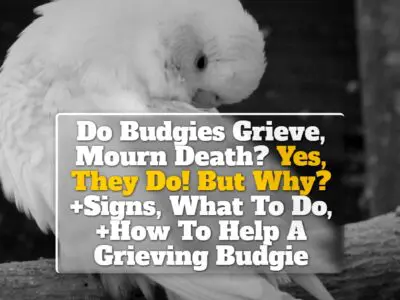Indeed, budgies can die from shock.
Various events like exposure to toxic fumes, acute heart attacks or strokes triggered by sudden noises, or severe trauma can cause this.
Additionally, stress factors like loud noises, heat exposure, smoke inhalation, or disease can lead to shock-induced deaths.
However, proper precautions can mitigate these risks.
Budgies, with their vivid colors and engaging personalities, bring immense joy into our lives.
However, they hide beneath their exuberance a susceptibility to a silent killer – shock.
In the ensuing text, we shall explore this complex subject, its potential causes, and measures we can adopt to prevent our beloved birds from meeting an untimely end.
What Are The Events That Can Shock And Kill Budgies Suddenly?
Severe Respiratory Distress (Toxic Fumes Or Airborne Irritants)
Respiratory distress in budgies is a grave concern, especially when induced by toxic fumes or airborne irritants.
Severe respiratory distress is not just an immediate danger; it can also induce a state of shock in these fragile creatures, causing sudden death.
This situation stems from their particularly sensitive respiratory system, which can easily be aggravated by pollutants in the air.
Toxic fumes, such as those released by certain types of cookware or cleaning products, can lead to severe respiratory distress.
These harmful fumes are not always perceptible to the human senses, making them a silent, invisible threat.
For instance, overheating non-stick cookware coated with teflon can release fumes toxic enough to induce severe respiratory distress in budgies.
Similarly, many common household cleaning products contain harsh chemicals that can irritate their respiratory tract and lead to severe respiratory distress and shock.
Airborne irritants such as dust, mold spores, or smoke can also be triggers.
Prolonged exposure to these irritants can result in chronic respiratory issues and potentially even shock in budgies.
Even brief exposure to strong irritants, such as smoke from a cigarette or fire, can trigger an acute episode of respiratory distress.
Acute Heart Attack Or Stroke (Fear Of Predators And Sudden Loud Events.)
An acute heart attack or stroke in budgies is a serious matter.
It can be triggered by intense fear reactions to predators or sudden loud events, pushing these small birds into a state of shock that can result in sudden death.
This potential health crisis underlines the vulnerability of budgies and their susceptibility to acute stressors in their environment.
The fear response in budgies, like many other birds, is an evolutionary adaptation to survive in the wild, where predators lurk.
Even in a domestic setting, this primal instinct is triggered when they perceive a threat.
This could be larger pets, like cats or dogs, or even a sudden, unexpected movement.
The resulting fear can cause a spike in their heart rate, leading to acute heart attacks or strokes.
Sudden loud events like fireworks, thunderstorms, or even an abrupt, loud noise can startle budgies, triggering a similar stress response.
The shock and fear from these abrupt noises can cause a surge in adrenaline, leading to an acute heart attack or stroke.
Severe Trauma (Being Crushed Or Attacked)
Severe trauma is a significant concern when it comes to the wellbeing of budgies.
This can result from being crushed or attacked, leading to a sudden and tragic death.
Given the small size and fragile structure of budgies, severe trauma can quickly lead to shock and potentially life-threatening complications.
Being crushed could occur in various ways.
Budgies might get inadvertently stepped on, trapped in closing doors or windows, or squished under moving objects.
These instances, though accidental, can cause extensive damage to the bird’s delicate body, leading to immediate shock and possibly death.
Similarly, budgies can suffer severe trauma from attacks by larger animals.
This could be domestic pets like cats or dogs, or even other larger birds.
These attacks can lead to severe physical injuries, significant loss of blood, and a heightened state of fear and stress that pushes the budgie into shock.
What Are The Things That Can Suddenly Shock And Kill Budgies, Or Shock And Kill Them In The Process?
Physical Trauma
From falls to collisions or other animal attacks, physical trauma stands as a daunting challenge in the lives of budgies.
The resulting shock can ultimately prove fatal.
Stress And Fear
Night Fright
Night fright, a term that might seem too dramatic for our diurnal existence, is a harrowing reality for our nocturnal friends.
For budgies, it’s a trigger for unmanageable stress and fear, leading to shock-induced deaths.
Loud Noises
An unexpected firework, a clap of thunder, or sudden loud music can trigger overwhelming fear in budgies, resulting in lethal shock.
Heat Exposure
Like a ruthless tyrant, heat waves can wage an unrelenting war against these delicate beings, instigating a wave of shock that could kill them.
Smoke Inhalation
Cooking With Teflon Pans
Something as routine as cooking with teflon pans can be an inadvertent weapon against budgies.
The resultant smoke inhalation could trigger shock and ultimately lead to their demise.
Cigarette And Tobacco Smoke
Likewise, smoke from cigarettes and tobacco products can set off a chain reaction ending in shock and the sudden death of budgies.
Cleaning Products
Even the fumes from some cleaning products can be toxic enough to induce shock, a fatal blow to these innocent creatures.
Illness/disease
Heart Disease
Budgies, much like humans, are susceptible to heart diseases.
The stress of this affliction can drive them into a state of shock, resulting in death.
Parasite Infestations
A parasite infestation in a budgie is more than just an uncomfortable scenario.
It’s a stressor that can trigger shock, leading to the bird’s untimely end.
Cancer
The ruthless reign of cancer isn’t exclusive to humans.
It casts a shadow over budgies too, causing shock and claiming their lives.
Organ Failure (Due To Aging)
Aging, an inevitable process, can trigger organ failure in budgies.
The shock from this failure can be the final nail in their coffin.
Proventricular Dilatation Disease (Pdd)
Proventricular Dilatation Disease, a condition as complex as its name, can cause severe discomfort and induce shock, leading to the budgie’s death.
Aspergillosis
Aspergillosis, a fungal disease, can wreak havoc on a budgie’s body, pushing it into a state of shock that could claim its life.
Polyomavirus (French Molt)
The Polyomavirus, or French Molt, isn’t just a feather disease.
It can put budgies in a state of shock and sudden death.
Dehydration Or Malnutrition
A simple lack of water or proper nutrition can drive budgies into a state of shock, culminating in their abrupt demise.
Pesticides Or Toxic Exposure
Pesticides or exposure to other toxins can be lethal, sending these delicate birds into a state of shock, leading to their sudden death.
Poor Handling
Rough handling, a harsh reality for some budgies, can inflict shock and result in their tragic end.
Environmental Changes
From temperature fluctuations to the introduction of new pets or people, environmental changes can provoke shock in budgies, leading to their unexpected demise.
Long Transport
Budgies might appear small and resilient, but long transports can induce stress and potentially trigger lethal shock.
Procedures Or Treatments
While meant to heal, some medical procedures or treatments can be stressful for budgies, setting off a chain of events that ends in shock and, unfortunately, death.
Egg Binding (Dystocia)
Egg binding or dystocia, a breeding complication, can place extreme stress on female budgies, resulting in shock and their untimely death.
What Precautions Can I Take To Prevent Budgies From Dying Suddenly From Shock?
Preventing sudden shock-induced deaths in budgies hinges on a few vital precautions.
The aim is to create a safe, stable, and stress-free environment for your pet, as well as ensuring that they are well-cared for and their health is routinely monitored.
The first precaution to take is providing a suitable and stable environment.
Budgies are sensitive to changes in their environment.
This includes temperature fluctuations, loud noises, and the introduction of new pets or people.
It is crucial to maintain a consistent environment that is free from these stressors.
Next, ensure that your budgie is safe from physical harm.
This means keeping them out of reach from other pets that might pose a threat, and ensuring they are safe from potential accidents in the home, such as being crushed by doors or windows.
Nutrition also plays a significant role in preventing shock.
A balanced diet, along with regular access to clean water, helps keep your budgie healthy and more resilient to stress.
Malnutrition or dehydration can weaken their system and make them susceptible to shock.
Preventing exposure to toxic substances is another crucial precaution.
Be conscious of the cleaning products you use around the house, and avoid smoking or using Teflon-coated pans near the bird.
These can release toxic fumes that could lead to respiratory distress and potentially induce shock.
Lastly, regular vet check-ups are important.
Routine health checks can help identify any potential health issues early and treat them before they escalate to a crisis.
FAQs
Can Pets Such As Dogs, Cats Also Shock Budgerigars Due To Fear?
Yes, larger pets such as dogs and cats can indeed trigger fear in budgies, potentially leading to shock and even death.
It’s crucial to keep such interactions monitored and controlled to prevent unnecessary stress.
What Are The First Signs That A Budgie Might Be Experiencing Shock?
A budgie undergoing shock might exhibit several symptoms.
These could include changes in behavior, such as becoming quiet or lethargic, panting or difficulty breathing, a change in the color of their cere or feet due to lack of oxygen, or loss of balance.
It is crucial to consult with a veterinarian immediately if these symptoms are noticed.
Can Changes In The Home Environment Lead To Shock In Budgies?
Yes, changes in the home environment can certainly lead to shock in budgies.
This could be triggered by a sudden change in temperature, addition of new pets or people, or even a change in location.
Budgies are sensitive creatures and require a stable and familiar environment for their wellbeing.
How Can I Create A Safe Environment To Protect My Budgie From Shock?
Creating a safe environment for budgies involves maintaining a stable temperature, providing a well-balanced diet, and avoiding loud noises or sudden changes in their surroundings.
Furthermore, the use of non-toxic cleaning products, not smoking around them, and careful handling can contribute significantly to their safety and wellbeing.
Can Medical Procedures Cause Shock In Budgies?
Unfortunately, yes.
Some medical procedures or treatments can be stressful for budgies and may lead to shock.
It is recommended that any medical procedures should be conducted under the supervision of a professional avian veterinarian to minimize stress and potential complications.
How Does Dehydration Or Malnutrition Contribute To Shock In Budgies?
Dehydration or malnutrition can lead to an array of health complications in budgies, one of which is shock.
Lack of proper nutrition can weaken their immune system, leaving them susceptible to diseases.
Similarly, dehydration can disrupt their body’s functioning, potentially leading to a state of shock.
Regular access to fresh water and a nutritionally balanced diet is crucial for their health.
Are Older Budgies More Susceptible To Shock?
Yes, older budgies might be more prone to shock compared to their younger counterparts.
This is primarily due to their overall declining health condition and potential for organ failure with age.
As budgies grow older, extra care and regular vet check-ups become increasingly important to manage their health effectively.



